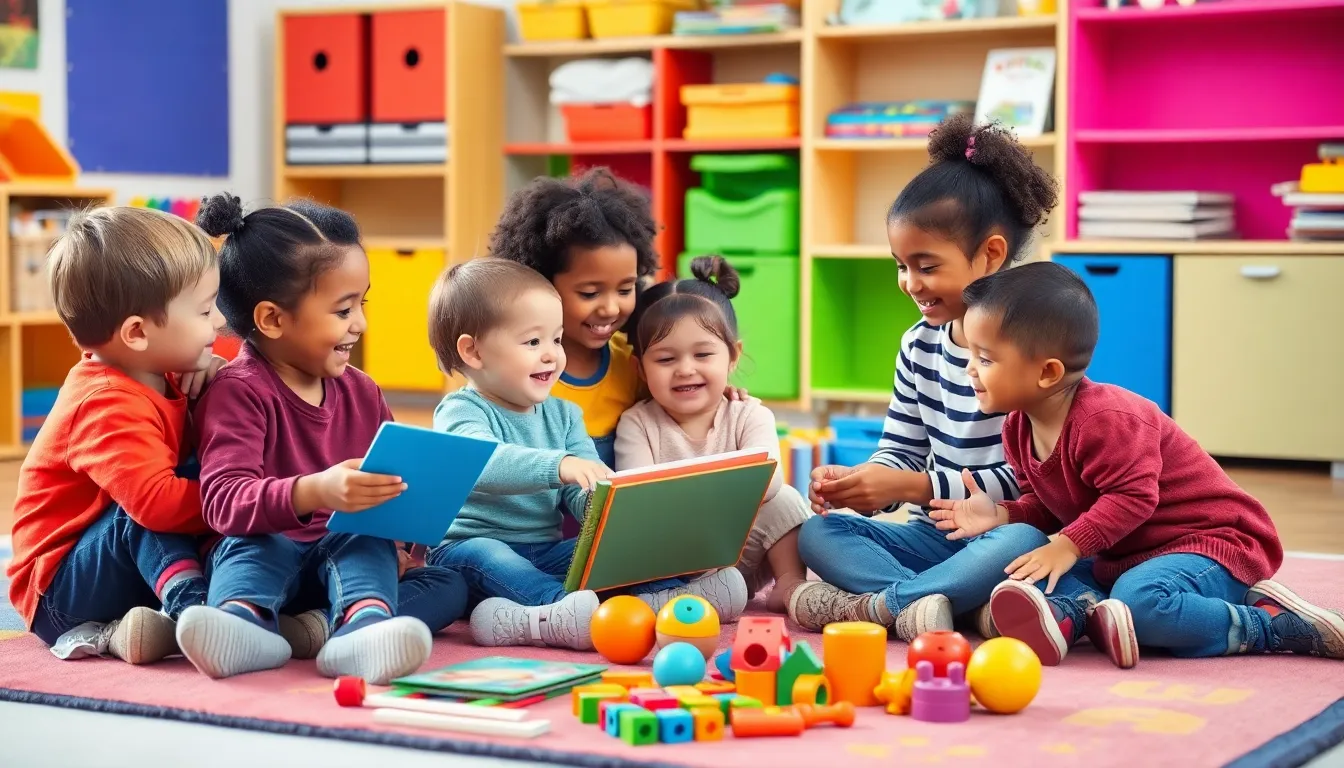Early childhood education plays a crucial role in shaping a child’s future. During these formative years, children develop essential skills that lay the groundwork for lifelong learning. Engaging in structured educational experiences helps them explore their interests, build social skills, and foster emotional growth.
As society increasingly recognizes the importance of these early years, parents and educators strive to create enriching environments that promote curiosity and creativity. Research shows that quality early education not only enhances cognitive development but also leads to better academic performance later in life. Investing in early childhood education is more than just a choice; it’s a commitment to nurturing the next generation.
Table of Contents
ToggleOverview of Early Childhood Education
Early childhood education (ECE) refers to organized programs and activities designed for children from birth through age eight. ECE promotes holistic development by focusing on emotional, social, cognitive, and physical growth. Research shows that quality early education prepares children for future academic success, decreases dropout rates, and fosters lifelong learning.
Structured learning environments encourage exploration and creativity. Play-based learning facilitates natural curiosity, allowing children to develop problem-solving skills. Social interactions, such as collaborative play, enhance communication abilities and emotional intelligence.
Early childhood education includes various formats, such as preschool programs, daycares, and home-based education. Each format plays a critical role in providing children with foundational skills needed for later educational experiences. The emphasis on individualized learning recognizes unique needs and learning paces, tailoring experiences to foster growth.
Investment in early childhood education yields significant returns. Studies indicate that every dollar spent on quality ECE saves between $7 and $10 in future social costs, demonstrating its importance to society. As governments and communities recognize this, they increasingly allocate resources to expand access and improve the quality of early education programs.
Importance of Early Childhood Education

Early childhood education (ECE) plays a crucial role in a child’s development, laying the foundation for lifelong learning and success. It focuses on nurturing key skills during critical early years, establishing a trajectory for future educational experiences.
Cognitive Development
Cognitive development in early childhood encompasses thinking, learning, and problem-solving skills. Research shows that children engaged in quality ECE demonstrate improved language skills and enhanced critical thinking abilities. Structured activities, such as games and hands-on learning experiences, stimulate cognitive processes. For instance, children exposed to early mathematical concepts perform better in formal schooling, directly impacting their academic readiness.
Social and Emotional Growth
Social and emotional growth is vital during early childhood. Programs centered around ECE foster skills like empathy and collaboration through group activities and interactive play. Children learn to navigate social situations, understand others’ feelings, and develop communication skills essential for relationships. Studies indicate that children with strong social-emotional skills experience better adjustment in school, leading to improved academic performance. As these foundational skills are established, children become more resilient, equipped to handle challenges in education and life.
Models of Early Childhood Education
Various models of early childhood education (ECE) exist, each with unique philosophies and methodologies that contribute to child development.
Montessori Method
The Montessori Method emphasizes self-directed learning, allowing children to explore their interests at their own pace. Classrooms feature prepared environments with hands-on, sensory materials that promote exploration and discovery. This approach encourages independence and critical thinking, with teachers acting as guides rather than traditional instructors. Children engage in activities that foster social, emotional, and cognitive skills, enabling them to develop responsibility and community awareness. Research indicates that students in Montessori environments often demonstrate superior academic performance in reading and math (American Montessori Society, 2021).
Reggio Emilia Approach
The Reggio Emilia Approach focuses on child-centered learning and the importance of community and collaboration in education. It encourages children to express themselves through various “languages,” such as art, music, and drama, fostering creativity and critical thinking. Teachers observe and document children’s activities, using this information to shape curriculum and learning experiences. This approach promotes partnerships among parents, educators, and the community, emphasizing the value of collaboration. Studies show that children in Reggio Emilia settings often exhibit higher levels of engagement and motivation (Gandini, 2012).
Challenges in Early Childhood Education
Early childhood education (ECE) faces various challenges that can hinder its effectiveness and accessibility. Addressing these impediments is crucial for ensuring children receive quality education in their formative years.
- Funding Limitations
Funding limitations restrict the expansion and improvement of ECE programs. Many institutions lack financial resources, impacting the availability of materials, staff training, and facility maintenance.
- Staffing Issues
Staffing issues significantly affect the quality of ECE. Low salaries contribute to high turnover rates among educators, leading to inconsistency in children’s learning experiences. Experienced teachers are essential for fostering developmental growth.
- Access and Equity
Access and equity present obstacles for many families. Disparities in availability make quality ECE programs challenging to reach for lower-income families, affecting early development and educational outcomes.
- Parental Involvement
Parental involvement is vital for reinforcing learning at home. However, busy schedules or lack of awareness about ECE’s importance can limit participation, which may lead to disengagement from the educational process.
- Curriculum Standardization
Curriculum standardization poses challenges as diverse learning styles and cultural backgrounds require tailored approaches. Adapting programs to meet children’s unique needs promotes more effective learning.
- Assessment Methods
Assessment methods often focus on academic readiness rather than holistic development. Relying solely on standardized tests can overlook emotional and social growth, which are equally important.
- Policy Support
Policy support remains inconsistent across regions. Effective advocacy and alignment with educational policies can bolster early childhood initiatives, but varying priorities affect implementation.
Addressing these challenges involves collaboration among policymakers, educators, and families to create a cohesive support system for early childhood education.
Future Trends in Early Childhood Education
Emerging trends in early childhood education (ECE) reflect advancements in technology, pedagogy, and societal needs. Awareness of these evolving trends enhances the educational landscape, benefiting children and families.
- Technology Integration
Technology integration enhances learning experiences. Educational apps, interactive games, and digital storytelling engage children while developing their digital literacy. Tools like tablets and smartboards provide interactive learning opportunities, fostering creativity and exploration.
- Personalized Learning
Personalized learning practices adapt to children’s unique needs and interests. Programs use data to tailor educational experiences, addressing varied developmental paces. This approach supports individualized growth, ensuring that all children thrive.
- Focus on Social-Emotional Learning (SEL)
Social-emotional learning gains emphasis in ECE programs. Incorporating SEL into curricula cultivates empathy, resilience, and collaboration among children. Activities that promote relationship-building support emotional health, preparing children for future interactions.
- Inclusivity and Diversity
ECE centers increasingly prioritize inclusivity and diversity. Programs celebrate cultural backgrounds, fostering an appreciation for different perspectives. This focus supports social cohesion, promoting understanding and respect among peers.
- Outdoor and Nature-Based Learning
Outdoor and nature-based learning experiences are on the rise. Encouraging exploration in natural settings supports physical health and cognitive development. Research indicates outdoor play enhances creativity and problem-solving skills, providing holistic growth opportunities.
- Family and Community Engagement
Increased family and community engagement strengthens ECE programs. Collaborations between educators, families, and community organizations create robust support systems. This engagement fosters a sense of belonging, enhancing children’s learning experiences.
- Mindfulness Practices
Integrating mindfulness practices into ECE promotes awareness and emotional regulation. Techniques such as breathing exercises and guided imagery help children manage stress and develop focus. Mindfulness contributes to better emotional and academic outcomes.
- Sustainability Education
Sustainability education becomes more prevalent in ECE settings. Programs teach children about environmental responsibility, fostering a sense of stewardship. This approach instills values that support eco-friendly behaviors as children grow.
By adopting these trends, early childhood education programs can better prepare children for lifelong learning and success.
Investing in early childhood education is crucial for nurturing well-rounded individuals. Quality ECE not only enhances cognitive and social skills but also lays the groundwork for future academic success. As society recognizes the importance of these formative years, the call for accessible and high-quality programs grows louder.
By embracing diverse educational models and integrating innovative practices, communities can create enriching environments that support every child’s unique journey. The focus on social-emotional learning and inclusivity ensures that children are not just prepared academically but also equipped with the skills to navigate life’s challenges. As stakeholders unite to prioritize early education, the benefits will resonate across generations, shaping a brighter future for all.



